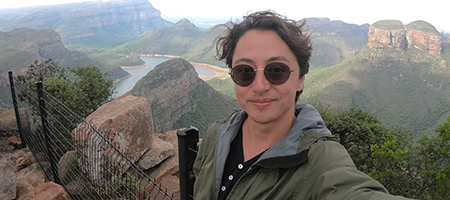Working on ground-breaking cases in South Africa

By Elliot Fonarev
My placement at Lawyers for Human Rights in Cape Town, South Africa was in the Gender Equality Programme, as well as assisting with the Penal Reform Programme. I want to highlight two projects that are reflective of LHR’s important work and which were transformative in my understanding of legal advocacy.
The first was assisting on a ground-breaking case in South Africa’s Equality Court. The applicant, represented by LHR, asked the courts to consider for the first time whether the nation’s Promotion of Equality and Prevention of Unfair Discrimination Act, 2000 prohibits discrimination against transgender people under government care (in this case, prisons). The decision is legally important for two reasons. First, with regard to gender equality and human rights for gender minorities, it will set a precedent in South Africa that will discuss transgender identity in law and determine the extent to which government has an obligation to reasonably accommodate gender nonconforming people in custody. Second, this case has significance for strengthening the rule of law and promise of South Africa’s post-apartheid democracy. Since before the end of apartheid in 1994, South Africa has had a passionate culture of constitutionalism and human rights advocacy. Today, to paraphrase my supervising lawyer, Sanja Bornman, if South Africa’s constitution is like the core root and trunk of a tree and other laws are the leaves which fill the tree, then the work of human rights lawyers and civil society organizations in international development is to fill the tree with healthy leaves, and ensure that there are fruits on the tree that all citizens can access through fair and equal treatment by all branches of government. LHR’s litigation work thus aims to achieve systemic remedies that change institutional policy and practice with regards to gender equality.
The other exciting project I will briefly mention is LHR’s work on the steering committee of the Hate Crimes Working Group, a civil society coalition formed in response to the government’s highly publicly-debated proposed legislation to criminalize hate crimes and hate speech through The Prevention and Combatting of Hate Crimes and Hate Speech Bill. Assisting with the group’s work on the Bill, I learned much about the formal and informal dynamics of policy and law-making in the process that was well beyond what I expected to participate in as a junior lawyer in Canada.
Finally, to say my personal time in Cape Town has been amazing is an understatement. South Africa has shown me incredible hospitality, adventure, culture, and soul – I will look back on this as an experience of a lifetime, both personally and professionally. I am so grateful to YLIP, the CBA, and GAC for facilitating the opportunity, and especially want to thank everyone at LHR for the wonderful experience.
Elliot Fonarev was called to the bar in 2018 in Ontario.